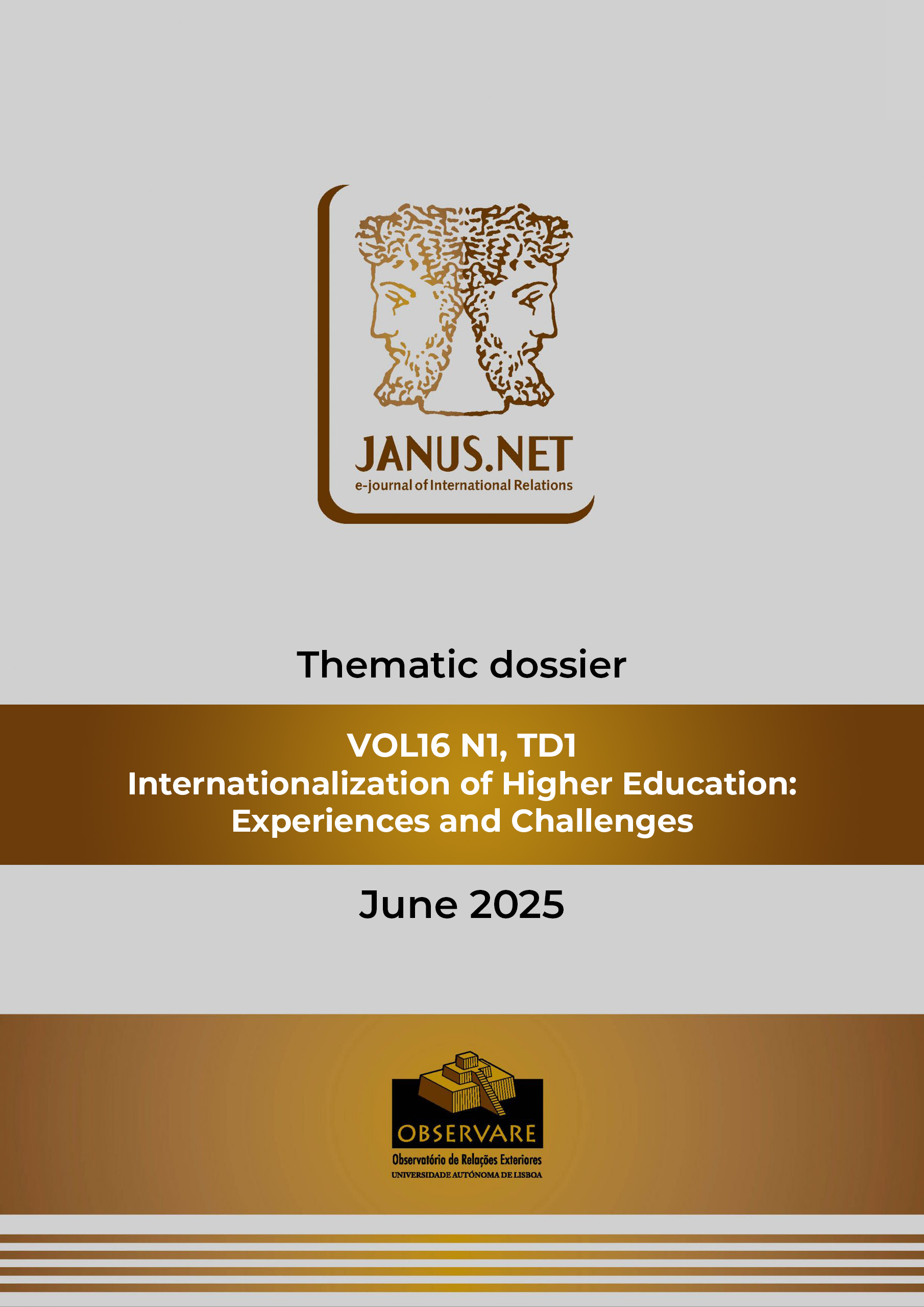Vol. 16, N.º 1, TD1, (2025), Thematic Dossier – Internationalization of Higher Education: Experiences and Challenges
https://doi.org/10.26619/1647-7251.DT0325

Internationalization, in the context of higher education, refers not only to the mobility of students, faculty, and academic programs, but also to the integration of international dimensions into curricula, research agendas, institutional strategies, and campus cultures. At the same time, Higher Education Institutions are increasingly expected to serve as agents of social transformation, embedding internationalization within broader goals of equity, sustainability, and human development. While these responsibilities entail complex challenges, they also present compelling opportunities for fostering intercultural dialogue, enhancing global competencies, and driving societal innovation on a global scale.
This thematic dossier, titled Internationalization of Higher Education: Experiences and Challenges, brings together a series of eleven scholarly articles that explore the multifaceted nature of internationalization in higher education, offering critical insights into its driving forces, lived realities, and the pressing challenges it entails. It features contributions that interrogate both the opportunities and tensions inherent in the internationalization process. Rather than conceptualizing internationalization as a fixed policy model, this issue examines it as a fluid, context-sensitive process intersecting with digital transformation, demographic transitions, geopolitical volatility, and institutional complexity. The articles compiled in this dossier approach the theme from a variety of disciplinary, methodological, and geographical perspectives. Indeed, the authors come from diverse academic fields — ranging from Education Sciences to International Relations, and from Law to Public Administration — and are affiliated with various higher education institutions across different countries, including Bulgaria, Brazil, Spain, Hungary, India, Kazakhstan, Portugal, Türkiye, and Uganda. Together, they aim to contribute to a deeper understanding of how internationalization unfolds in practice, what it means for students, educators, and institutions, and how it can be navigated responsibly and ethically.
ARTICLES
DEVELOPMENT OF INFORMATION LITERACY IN HISTORY AND CIVIC EDUCATION AS A 21ST-CENTURY LEADERSHIP SKILL
ÁRON FEKETE, RICHÁRD FODOR, JÁNOS SETÉNYI
MULTICULTURAL PERSPECTIVES AND GLOBAL LEADERSHIP IN HIGHER EDUCATION
PUSAT PILTEN, GÜLHIZ PILTEN
MANAGEMENT STYLES AND ORGANIZATIONAL INTELLIGENCE LEVEL OF HIGHER EDUCATION ADMINISTRATORS
DILEK YÖRÜK
THE EUROPEAN HIGHER EDUCATION ALLIANCES: THE CHALLENGES OF TRANSNATIONAL UNIVERSITY COOPERATION
CONCEPCIÓN ANGUITA-OLMEDO
HIGHER EDUCATION FROM AN INCLUSIVE GOVERNANCE PERSPECTIVE: EXPANDING THE BOUNDARIES OF SOCIAL JUSTICE
NILAY NEYIŞCI
NURTURING AND UPBRINGING; THE FORGOTTEN ASPECT IN CURRICULUM DEVELOPMENT AND IMPLEMENTATION AT HIGHER EDUCATION INSTITUTIONS(HEIS)
MIIRO FAROOQ, GRACE K. BAGUMA
GLOBALIZING THE INDIAN HIGHER EDUCATION: A CRITICAL APPRAISAL
VESSELIN POPOVSKI, RAJAT SHANDILYA
EXPLORING PLASMA LEADERSHIP IN TURKISH UNIVERSITIES: A DOCUMENT-BASED ADMINISTRATIVE PERSPECTIVE
HANDAN EGE, ŞEFIKA ŞULE ERÇETIN
INTERNATIONALIZATION OF HIGHER EDUCATION AND PUBLIC POLICY: ADVANCES AND SETBACKS IN THE STRATEGIC ACTIONS FOR THE INTERNATIONAL INTEGRATION OF BRAZILIAN UNIVERSITIES
JOSÉ ALBERTO MIRANDA, JACKSON LUIZ NUNES BENTES
A Direcção Editorial do JANUS.NET, e-journal of international relations, e os autores agradecem aos revisores científicos que apreciaram os artigos submetidos.

